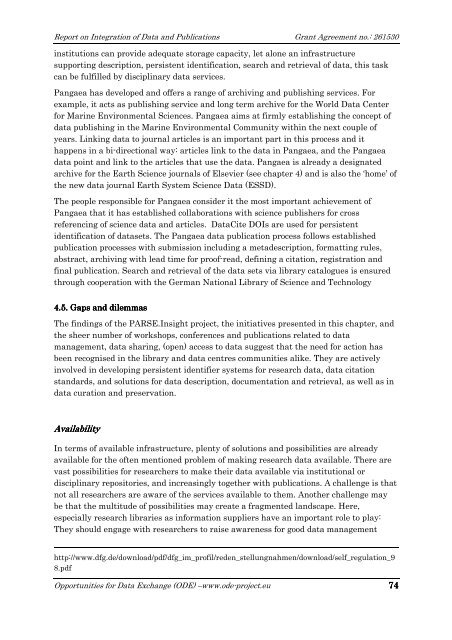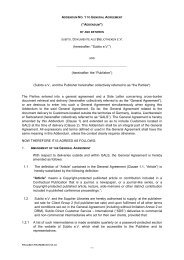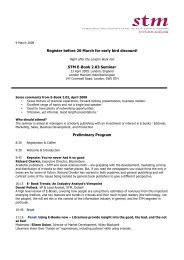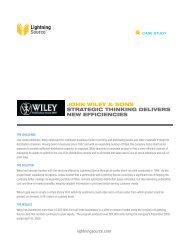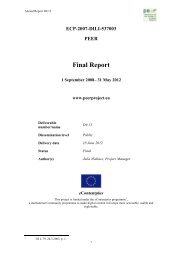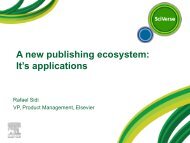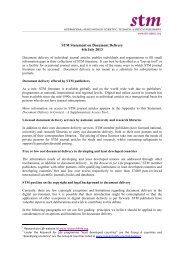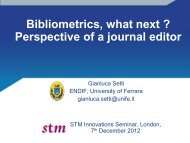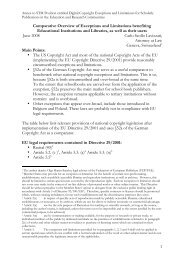Integration of Data and Publications - Alliance for Permanent Access
Integration of Data and Publications - Alliance for Permanent Access
Integration of Data and Publications - Alliance for Permanent Access
Create successful ePaper yourself
Turn your PDF publications into a flip-book with our unique Google optimized e-Paper software.
Report on <strong>Integration</strong> <strong>of</strong> <strong>Data</strong> <strong>and</strong> <strong>Publications</strong> Grant Agreement no.: 261530<br />
institutions can provide adequate storage capacity, let alone an infrastructure<br />
supporting description, persistent identification, search <strong>and</strong> retrieval <strong>of</strong> data, this task<br />
can be fulfilled by disciplinary data services.<br />
Pangaea has developed <strong>and</strong> <strong>of</strong>fers a range <strong>of</strong> archiving <strong>and</strong> publishing services. For<br />
example, it acts as publishing service <strong>and</strong> long term archive <strong>for</strong> the World <strong>Data</strong> Center<br />
<strong>for</strong> Marine Environmental Sciences. Pangaea aims at firmly establishing the concept <strong>of</strong><br />
data publishing in the Marine Environmental Community within the next couple <strong>of</strong><br />
years. Linking data to journal articles is an important part in this process <strong>and</strong> it<br />
happens in a bi-directional way: articles link to the data in Pangaea, <strong>and</strong> the Pangaea<br />
data point <strong>and</strong> link to the articles that use the data. Pangaea is already a designated<br />
archive <strong>for</strong> the Earth Science journals <strong>of</strong> Elsevier (see chapter 4) <strong>and</strong> is also the ‘home’ <strong>of</strong><br />
the new data journal Earth System Science <strong>Data</strong> (ESSD).<br />
The people responsible <strong>for</strong> Pangaea consider it the most important achievement <strong>of</strong><br />
Pangaea that it has established collaborations with science publishers <strong>for</strong> cross<br />
referencing <strong>of</strong> science data <strong>and</strong> articles. <strong>Data</strong>Cite DOIs are used <strong>for</strong> persistent<br />
identification <strong>of</strong> datasets. The Pangaea data publication process follows established<br />
publication processes with submission including a metadescription, <strong>for</strong>matting rules,<br />
abstract, archiving with lead time <strong>for</strong> pro<strong>of</strong>-read, defining a citation, registration <strong>and</strong><br />
final publication. Search <strong>and</strong> retrieval <strong>of</strong> the data sets via library catalogues is ensured<br />
through cooperation with the German National Library <strong>of</strong> Science <strong>and</strong> Technology<br />
4.5. Gaps <strong>and</strong> dilemmas<br />
The findings <strong>of</strong> the PARSE.Insight project, the initiatives presented in this chapter, <strong>and</strong><br />
the sheer number <strong>of</strong> workshops, conferences <strong>and</strong> publications related to data<br />
management, data sharing, (open) access to data suggest that the need <strong>for</strong> action has<br />
been recognised in the library <strong>and</strong> data centres communities alike. They are actively<br />
involved in developing persistent identifier systems <strong>for</strong> research data, data citation<br />
st<strong>and</strong>ards, <strong>and</strong> solutions <strong>for</strong> data description, documentation <strong>and</strong> retrieval, as well as in<br />
data curation <strong>and</strong> preservation.<br />
Availability<br />
In terms <strong>of</strong> available infrastructure, plenty <strong>of</strong> solutions <strong>and</strong> possibilities are already<br />
available <strong>for</strong> the <strong>of</strong>ten mentioned problem <strong>of</strong> making research data available. There are<br />
vast possibilities <strong>for</strong> researchers to make their data available via institutional or<br />
disciplinary repositories, <strong>and</strong> increasingly together with publications. A challenge is that<br />
not all researchers are aware <strong>of</strong> the services available to them. Another challenge may<br />
be that the multitude <strong>of</strong> possibilities may create a fragmented l<strong>and</strong>scape. Here,<br />
especially research libraries as in<strong>for</strong>mation suppliers have an important role to play:<br />
They should engage with researchers to raise awareness <strong>for</strong> good data management<br />
http://www.dfg.de/download/pdf/dfg_im_pr<strong>of</strong>il/reden_stellungnahmen/download/self_regulation_9<br />
8.pdf<br />
Opportunities <strong>for</strong> <strong>Data</strong> Exchange (ODE) –www.ode-project.eu 74


